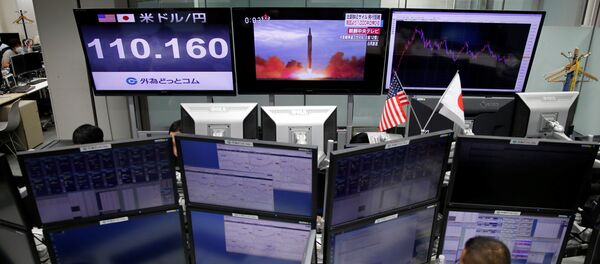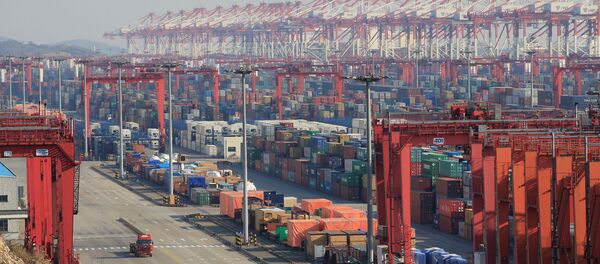Kristian Rouz — The Japanese economy continues to show signs of lingering weakness amid faltering exports, sluggish domestic consumption, and the excessive amount of real and potential overseas risks. Bank of Japan (BOJ) policymakers say, albeit their assessment of economic health remains unchanged for now, that the forecast might be in for a downgrade later this year.
According to BOJ officials, the regulator is considering lowering its GDP growth expectations for the past fiscal year that ended on 31 March, and in the fiscal 2019/20. Policymakers say weaker-than-expected industrial output over the past few months, as well as underperforming inflation cast doubt over their previous assessments — although for now, the broader picture appears to be stable.
Economists say the biggest risk facing central bankers is the weak inflation, which has yet to reach the BOJ's 2-percent target — after years of unconventional monetary stimulus, zero-and-negative interest rates, and steady domestic investment.
"There simply isn't enough momentum toward 2 percent inflation, because wages are not rising that much", Hiroshi Miyazaki of Mitsubishi UFJ Morgan Stanley Securities said. "The BOJ became passive last year because it was worried about banks' earnings. This year the BOJ could fine tune its policy if other economic indicators worsen further".
READ MORE: Bank of Japan Cuts Outlook on Global Economic Growth, Keeps Stimulus Intact
Officials said Japan's shipments to Mainland China had dropped amid the ongoing Sino-American trade tensions — which pose risks of disruptions in their trade with third-party countries.
Additionally, the Cabinet Office said the recovery in Japan's consumer spending has been slow this year due to the weak inflation and a lacklustre performance of the industrial sector. Japanese manufacturers are reliant on the exports of electronic parts and equipment to China — where these products are used to manufacture the lion's share of goods bound for the US.
The Japanese government also said that the slow progress in trade talks between the US and China poses a risk of extended uncertainty — which could hold back Japan's economic momentum.
BOJ policymakers say these factors will likely prevent Japan's inflation rate from gaining any momentum until the year 2021.
"Inflation is holding up but isn't accelerating much either", an anonymous BOJ official said, as quoted by Reuters. "Inflation will gradually head toward 2 percent but the pace will be moderate at best".
Amid these latest developments, some officials and economics experts are calling on the Japanese government to postpone its planned hike in sales tax from 8 to 10 percent — saying the move could further impair the fragile economic expansion.
Government officials disagree, saying the hike is necessary to bolster Japan's budget sustainability, as it faces an elevated debt-to-GDP ratio of roughly 300 percent.
READ MORE: Japan Industrial Sector Shows Signs of Slowdown Amid Weaker Investment Plans
"The sales tax hike to 10 percent is needed the most to secure stable financial resources to pay for social security for all generations, in order to cope with the ageing population", Finance Minister Taro Aso said. "We will proceed unless a big incident like the Lehman shock occurs".
Meanwhile, the BOJ are not convinced Japan will be able to avoid all the risks to its economic expansion this year — unless the US-Chinese trade talks wrap up sooner than expected, and Japan is able to subsequently strike a US trade deal of its own.
This scenario, however, appears to be unlikely. The BOJ is set to hold its next policy meeting on 24-25 April. Economists believe Japan's base interest rates will remain unchanged at —0.1 percent, with near-zero yields as part of the ongoing effort to boost business activity and consumer confidence.






